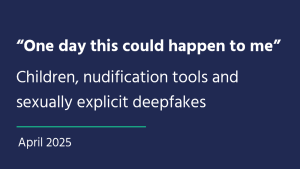In light of the shocking case of Child Q, a 15-year-old Black girl who was strip searched while at school in Hackney nearly four years ago, I wanted to use my statutory powers as Children’s Commissioner to investigate the practice of strip searching children by the police. Child Q’s case was so extreme that I wanted to ensure it was a one-off – I was clear that ‘sorry’ was not sufficient. Such a case should and could not happen again.
The findings from my initial project, focusing on the Metropolitan Police, were alarming. They exposed system-wide issues in the force with a lack of transparency, minimal scrutiny and non-compliance with statutory codes of practice when carrying out strip searches of children under stop and search powers, leaving these children exposed to unacceptable safeguarding risks.
My second report, in March 2023, used data from police forces across England and Wales and proved that these issues were systemic, not isolated – they could be seen nationally. I am grateful to the many members of both Houses of Parliament for their efforts in bringing attention to the findings and the urgent change that is needed, as well as the responses from a range of organisations in support of my recommendations, many of which were subsequently recognised in the Government’s recent review of the codes of practice for strip searching children and vulnerable people.
In this latest report, the third in my series of work, I present a complete analysis of strip searches conducted by police across England and Wales across five and a half years of data, from 2018 to 2023, including new data for 2022 to 2023. My research again confirms that the issues are not confined to London – indeed, there are indications that outside of London the issues are even more deeply entrenched. Throughout England and Wales, police continue to strip search children as part of stop and searches, revealing concerning practices and widespread failure to comply with safeguarding procedures designed to protect children.
Senior police officers have shared with me that there will be certain, limited times when an immediate risk of harm means that a search of this nature is both appropriate and necessary. My firm recommendation is that this should only be the case where there is a clear and immediate danger to the child or others. However, the majority of searches are still conducted on suspicion of drugs and nearly half result in no further action, indicating that many traumatic searches, similar to the experiences of Child Q, could be preventable. If such an intrusive and potentially traumatic power is deemed necessary, it must be accompanied by robust safeguards after considering of potential long-term impacts on children’s mental health.
At the time of publication, there is much attention on children’s involvement with the police, in the wake of violent riots around the country. This disorder has been distressing to witness and I am clear that any individual found to have been involved should face appropriate consequences. But – first and foremost – children are children and need to be treated as such. Every interaction with a child should be viewed as an opportunity to understand their situation, safeguard them from exploitation, and work with them positively to prevent their involvement with crime.
More encouragingly, this third report shows there are signs of clear and positive change. The total number of strip searches conducted across England and Wales appears to be declining, particularly in London. This suggests that some efforts to address the issue are having an impact. Additionally, while the disproportionate number of searches that Black children experience remains a critical concern, the disparity has reduced. Black children are now four times more likely to be strip searched compared to national population figures, rather than six times as previously reported. This indicates steps are being taken in the right direction, though much work remains to resolve this inequality.
Additionally, we are seeing evidence that the majority of police forces have made procedural changes to how they carry out strip searches and nearly half of searches between July 2022 and June 2023 resulted in the force making a safeguarding referral – a significant increase from previous years and an indication that an increasing number of children who experience a strip search are receiving support afterwards.
In total, 457 searches were conducted on children between July 2022 and June 2023 in England and Wales – which is equivalent to one child every 19 hours over this period, on average. Of these, half resulted in no further action being taken – calling into question the necessity of such an intrusive search in the first place.
Furthermore, this report presents new evidence that police forces are, on average, twice as likely to routinely record additional characteristics of vulnerability, such as whether a child is in care, has a medical condition or is a victim of sexual exploitation, for searches in custody compared to searches under stop and search. As strip searches under stop and search are conducted in a less controlled environment and often under high-tension, time-pressured conditions, strip searches during stop and search should undergo more rigorous scrutiny than those conducted in custody, not less. More must be done to safeguard vulnerable young people, and mitigate significant unrecorded data, which is currently obstructing proper transparency and scrutiny.
The current system still lacks effective safeguarding procedures. It relies heavily on frontline officers, who are not specialists, to always act correctly, without adequate scrutiny to ensure adherence to vital safeguards, and with little consideration of the impact on vulnerable children. It cannot be the job of police officers alone – we need health and children’s social care services to step up as the other statutory safeguarding partners and consider how to commission mental health and neurodiversity support. Consideration also needs to be given to bringing in education, youth work and youth justice services.
My sustained attention on this issue stems not from internal whistle-blowers or inspection reports but from the bravery of a girl speaking out about her traumatic experience. There is an urgent need to strengthen guidance around strip searches, ensure oversight and inspection, and reform a culture that has allowed non-compliance to go unchallenged. It is unacceptable that police forces across England and Wales cannot adequately account for the necessity, circumstances, and safeguarding outcomes of every strip search of a child they have conducted. The way these searches have been conducted indicates that police too often forget that children are children. The primary duty of the police, as with all professionals, should be to protect children from harm. We must strive for a system where an officer encountering a child suspected of carrying drugs or a weapon prioritises their safety first, always.




